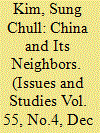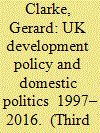| Srl | Item |
| 1 |
ID:
170624


|
|
|
|
|
| Summary/Abstract |
With respect to China and its neighbors, what are the political implications when a great power advances economically into small states? This paper presents an asymmetry–coercion linkage to explain the relationship between a great power and small states by reconceptualizing Albert Hirschman’s theory of trade dependency. This reconceptualization involves two tasks. First, the paper explicates vulnerability to coercion as a consequence of economic asymmetry, whereby a small state becomes susceptible to a great power’s compellence or co-optation to take a certain path preferred by the latter. Second, in demonstrating and measuring vulnerability to coercion, the paper accounts for the three factors: trade concentration, non-transparency, and reliance on bilateral aid. The combined effect of these three factors is that among the six countries under investigation, Cambodia and North Korea are extremely vulnerable to China’s coercion, while Vietnam is the least vulnerable state
|
|
|
|
|
|
|
|
|
|
|
|
|
|
|
|
| 2 |
ID:
157707


|
|
|
|
|
| Summary/Abstract |
Debate surrounds the relative importance of development aid and development policy in donor efforts to support international development. Likewise, the literature on UK development policy points to its putative stability and consistency over time. Both perspectives, however, underplay the political contention which characterises UK development policy and its variable effects. This article, therefore, examines UK development policy between 1997 and 2016 and the varying extent to which it gave rise to contentious politics over time. It explores three politically-significant periods in the context of UK development policy between 1997 and 2016: the first between 1997 and 2003, characterised, I argue, by political consensus and managed contention; a second between 2003 and 2010, characterised by transition and emerging political contention; and a third, between 2010 and 2016, characterised by contentious politics and political fracturing. I associate the first period with effective political vision and direction and the third with a significant erosion of both, to the detriment of UK development policy and its efficacy. In conclusion, I argue that UK development policy has been most effective when it has been underpinned by a clear and consensual political vision.
|
|
|
|
|
|
|
|
|
|
|
|
|
|
|
|